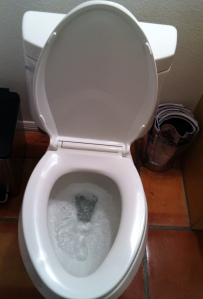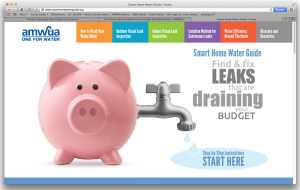Water Bill Too High? Cities Offer Free Water Audits

By Kathleen Ferris
Homeowners are quick to blame water meters when their water bills escalate.
Water meters can malfunction, but an overcharge is rare. Water meters usually slow down with age. That means a faulty meter is more likely to undercharge, not overcharge, homeowners for the water they've used. That's why cities keep water meters working and replace them as quickly as possible when they malfunction. So, maybe your water bill is higher because your city upgraded your water meter and it is more accurate.
Then, again, you may have graduated to a new water rate. Many cities in the Phoenix Metropolitan Area use a tiered rate structure. This means the more water you use, the more you pay per gallon. If you’ve hosted guests, added to your family, or are watering new landscaping, you may move into a tier that kicks up your costs.
Nothing unusual? Then you may want to check with your city. Sometimes the mystery can be solved with a phone call. If you need more help, many of the AMWUA member cities offer homeowners free water audits. For example, the Town of Gilbert’s water conservation professionals conduct an average of 250 residential audits a year. These experts come prepared with knowledge, experience and your water-use history.
A water auditor is most likely to start by examining your water meter to make sure it is working properly. If the water-using fixtures are off in your home and the meter is not turning, the issue is likely in the irrigation system. In Gilbert, 95 percent of problems are found in irrigation systems. Here are a few common ones:
- Irrigation controller: A water auditor will help you understand your controller and examine its programs to make sure it is watering when, where and for how long you think it is. Sometimes a homeowner or landscaper can accidentally restart a June watering program in the middle of November. Auditors also come prepared with guides that help you determine when and how long to water your particular plants and trees.
- Irrigation lines: A leak in a buried pipe can be hidden under a block fence, thick gravel or a hedge. An auditor knows what to look for and where to look.
- Drip emitters: Expect an auditor to examine your drip emitters. Some are labeled as one-gallon-per hour emitters. If they are dripping at a consistent rate, they probably are using about a gallon or two each hour. If they are streaming, that same emitter is using 8 to 9 gallons per hour. Some emitters can quietly malfunction and go from dripping to streaming without you noticing, particularly if you water when you are not home or during the night.
If the water-using fixtures are off in your home, but the meter continues to run, the problem is likely inside your home or with a pool or spa. Here are some common interior problems.
- Toilet: When it comes to interior leaks, your toilet is the most likely suspect. The auditor will drop a dye tablet in a toilet’s tank and turn the water blue. If the blue water then appears in the bowl, your toilet is leaking. The main culprits: flappers and fill valves. The flapper valve is a rubber piece that seals the tank shut and opens when you pull the handle to flush. If it gets warped or isn’t sealing properly, the tank leaks. Then there is the fill valve in your tank that keeps the water level constant. If the fill valve malfunctions, the water level increases and extra water goes down an overflow tube and into the toilet bowl instead of onto your bathroom floor. While you are avoiding a flood, you are paying for water that does nothing but flow into the toilet and out your sewer line.

- Water softener: The auditor will check for signs that the recharge valve on your water softener has malfunctioned and the system is recharging far too often or continually. Once again, that means you are paying for water flowing in and out of your home without serving any purpose. Your recharge system uses about one gallon per minute. If it runs non-stop for thirty days that can raise your water use by 43,200 gallons.
- Reverse Osmosis: A failed RO valve also continually dumps unused potable water directly into your sewer connection. A malfunction in these under-the-sink systems can waste up to 4,000 gallons per month.
For some homeowners, it may be difficult to find the time to schedule a visit. AMWUA has another option: The Smart Home Water Guide or Guía para Detectar Fugas.

This mobile online site, hosted by AMWUA’s #SmartPig, is a step-by-step guide that allows you to conduct your own water audit. The guide is easy to use on your phone or tablet and you can check out one system at a time when it’s convenient for you. A 24-page Smart Home Water Guide booklet also is available - in English or Spanish - from your city’s water conservation office.
So is a free water audit by your city worth the time? The Town of Gilbert measures the amount of water used at a home the year before an audit and then compares it to the amount of water used at the same home a year after the audit. The average savings per home is 40,000 gallons. You tell me if it’s worth it.
For 46 years, Arizona Municipal Water Users Association has worked to protect our member cities’ ability to provide assured, safe and sustainable water supplies to their communities. For more water information visit www.amwua.org.
To stay informed, sign up for the AMWUA blog